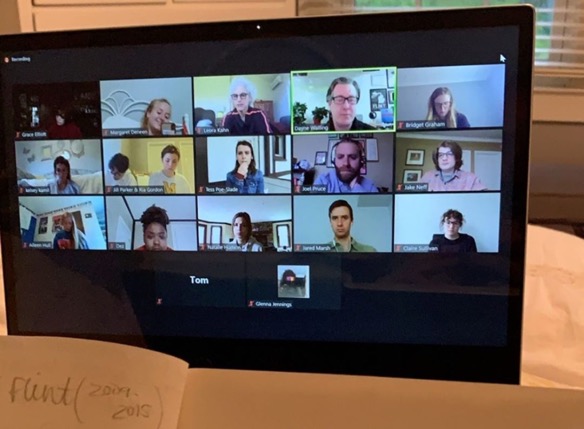Let's Talk Human Rights

Moral Courage Project Goes Remote
By Maria “Ria” Gordon '20 and Bridget Graham '22
The Moral Courage Project is a multimedia storytelling project that began in 2016 with “Ferguson Voices.” This project aims to tell the stories of “upstanders” (those who refuse to be bystanders), and identify and celebrate individuals who take risks to make important contributions for their communities during moments of crisis. The project does this by training students in interviewing and human rights’ storytelling techniques, as well as concepts of agency, voice and human rights defending.
This year, the Moral Courage Project (MCP) is in its third iteration, with students investigating the crisis in access to clean water in Appalachia, and in Flint and Detroit, Michigan. Over 30 million Americans in total did not have consistent access to safe and clean drinking water last year. Water is considered essential to life and as a result is defined as a right by international law and UN declarations, though it isn’t guaranteed for many in the US for both environmental, economic, and political reasons. Originally, students had planned to travel to Whitesburg, Kentucky on May 11, however due to COVID-19 and Stay-At-Home Restrictions, students are unable to travel for the project.
Despite these circumstances, MCP students have been persistent and creative: they are now conducting all interviews over the phone and via Zoom video calls. Rather than getting to know Whitesburg on foot, students were guided through the city virtually by speakers and storytellers with whom MCP has engaged.
Additionally, instead of trying to work around the current Covid-19 crisis, students are investigating the intersections between the COVID-19 pandemic and the preexisting issues of access to clean water in Appalachia, Flint, and Detroit. Some of the topics being investigated by MCP students include: the role of democracy and politics in water management, sustainability and economic justice, activism and civic engagement by individuals and community groups, and the health issues, all through the lens of COVID-19 and the water crisis.
Amid the coronavirus pandemic, the problems facing communities without regular water access have grown even more pronounced, with residents lacking clean water to maintain hygiene or being forced to buy large amounts of bottled or distilled water in order to avoid contaminated water. Through MCP, student researchers have found that rather than the local governments filling the need for water, it is local water advocacy groups and activists who are leading the fight for clean water for all.
Like many businesses, projects, and organizations, this is the first time the Moral Courage Project will attempt to go remote because of the pandemic. MCP on access to clean water will run throughout the summer with a cohort of fellows working on organizing the summer work to prepare for the fall semester. At that time, the MCP students are planning to work until the end of 2020 on curating the multi-media products which constitute the final exhibit.
Even though the future is uncertain, the Moral Courage Project team is committed to overcoming barriers and finding ways to continue to tell the stories of upstanders around the United States. After all, that is what moral courage is all about.
Maria “Ria” Gordon is a May 2020 graduate of the Art Education Program. Ria worked on Moral Courage Project initiatives at the Center.
Bridget Graham is a rising junior majoring in Human Rights Studies and Political Science and an intern at the Human Rights Center.
